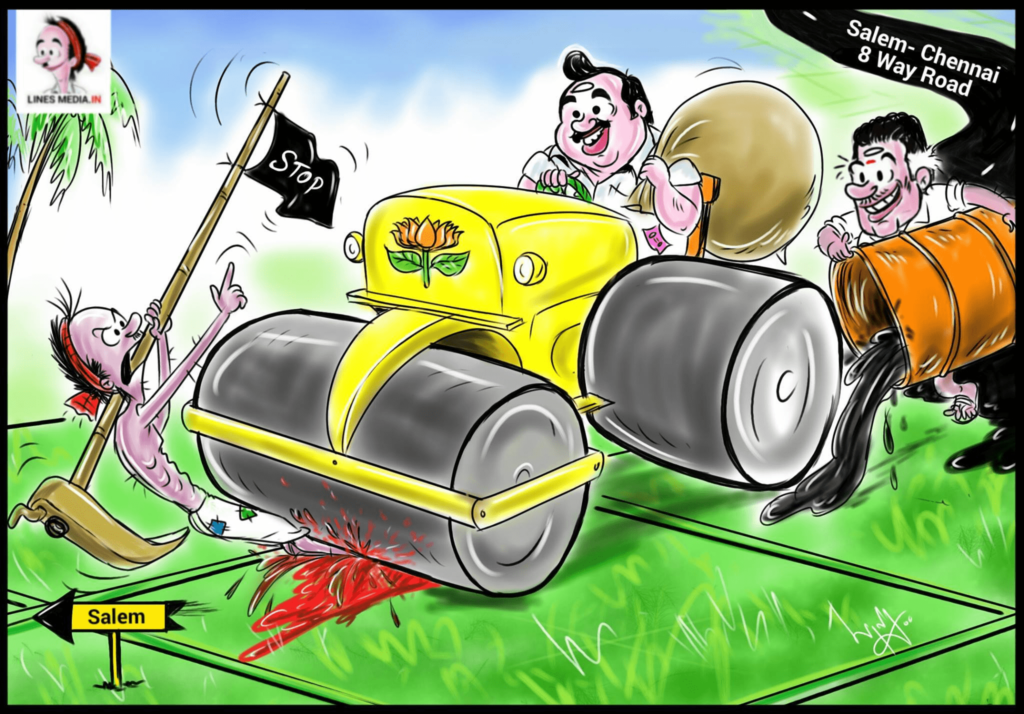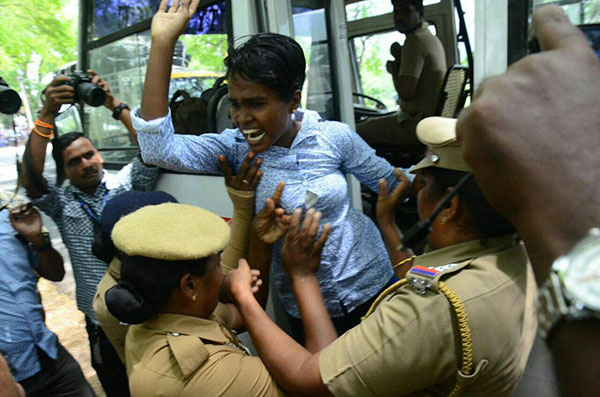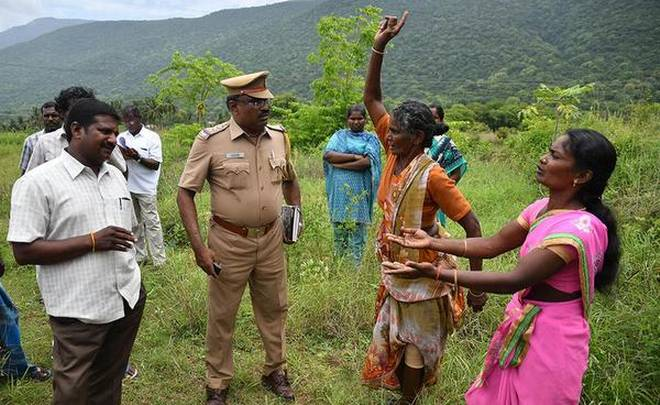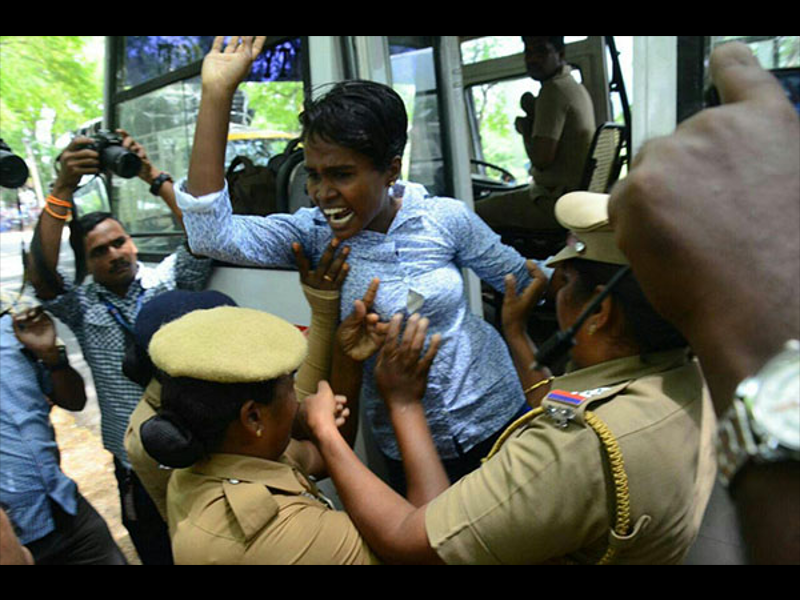While no action has been initiated against Thoothukudi police personnel who shot 131 bullets at unarmed protestors, killing 13 and maiming many others in broad daylight, the police have been rounding up and arresting people who participated in the agitation against Sterlite. However, resistance against such ‘development projects’ now seems to be spreading across Tamil Nadu. The most recent upheavals being the ones against an upcoming access-controlled 8-lane expressway connecting Chennai to Salem, and expansion of Salem’s airport. Like in Thoothukudi, TN administration have chosen the tactic of harassing civilians, activists, farmers, students and even actors, in order to push it’s way through. Tamil Nadu is under siege – writes Lois Sofia. This is the second part in the series. You can read the first part here.
Bulldozing through the Chennai-Salem “Green” Corridor
The Tamil Nadu government’s modus operandi of crushing dissenting voices with brute force to make way for so-called development projects has recently extended to protests in and around Salem and Tiruvannamalai districts against the upcoming access-controlled 8-lane expressway connecting Chennai to Salem, and the expansion of Salem’s airport, where the police have been arresting activists, farmers, a student and an actor without any legitimate reason.
Estimated to cost about Rs. 10,000 crores the highway will cover a distance of 277 km across five districts— Kanchipuram, Thiruvanamalai, Krishnagiri, Dharmpuri and Salem. The government maintains that it will reduce the travel time from Chennai to Salem by 3 hours and distance by 60 kms. The unironically named ‘Chennai-Salem Greenfield corridor’ will pass through seven rivers, 159 villages, more than 750 wells and cause irreversible environmental damage to at least eight reserve forests spread over 120 hectares.
Apart from the loss of 2791 hectares of farming, forest, residential and poromboke (common) lands, activists and forest officers say around 1 lakh trees will be felled even though government assessment puts the number at 6400. Environmentalist Nityanand Jayaraman has pointed out that massive amounts of sand required for construction of the highway is expected to be mined from rivers in water stressed regions already notorious for illegal sand mining. Besides the environmental impact, the loss of fertile land and their livelihoods has forced local farmers to rise in protests.
In the absence of information from the government on the need for this project, or how it would contribute to development in the state, speculation is rife that it is being undertaken to transport iron ore from the Kavuthimalai, Vediyappanmalai (Thiruvannamalai) and Kanjamalai (Salem) hills, where for years there has been strong opposition against any mining activity. The pre-feasibility report for the Chennai-Salem highway, a product of brazen plagiarism, mentions that “Southern Iron & Steel Company Ltd (joint venture with JSW Steel)… aims to develop the Kanjamalai, Kavuthimalai and Vediappanmalai iron ore mines in Tamil Nadu on receipt of requisite approvals to improve raw material security”. The alacrity and aggressiveness with which the Tamil Nadu government is pushing through the project, without any transparency or public consultations and indiscriminate arrests of those who question its merits, has alarmed farmers and political observers alike.

Cartoon depicting Tamil Nadu Chief Minister Edappadi Palaniswami and Deputy Chief Minister O Panneerselvam. Courtesy: Cartoonist Bala
Unprovoked arrests of activists, farmers and journalists
Opposition to the Central government funded Chennai-Salem highway project had been building among the locals and environmentalists. A federation comprising of about 13 organisations, which brought together farmers, NGOs which work on environmental issues, lawyers and some political parties, was formed to oppose the project and started voicing their objections. Arrests of those protesting the government’s plans started early in June, not long after the approval process was completed, and have intensified in the past ten days. On June 8th, R.S. Narayanan, a farmer from Kuppanur village in Salem district got into an altercation with officials who were marking fields without giving any notice to the farmers, was taken into custody by the police the following morning at 4 am and released later. According to a Firstpost report, Narayanan said, “The next morning, at 4 am, a police team came home and picked me up. Till 1 pm, I was detained at the police station. Is it a crime to ask questions? No one tells us anything, no one is bothered about our problems. If you ask or object, you get arrested. We are being intimidated.”
On June 18th, environmental activist Piyush Manush, who has been vocal in his opposition to the expressway and airport extension projects, was arrested for organising meetings in Thumbipadi, Pottiyapuram and Sikkanampatti villages in Salem district back in May. The previous day actor Mansoor Ali Khan was also arrested for allegedly making provocative speeches inciting violence at the same May 3rd meetings, following a complaint from the Village Administrative Officer Maari Veerasami of Thumbipadi village. Early last month he had also participated in a hunger strike organised in Thoothukudi as part of the anti-Sterlite struggle.
Piyush Manush has been named accused No. 1 in the case and Mansoor Ali Khan, No. 2. They have been booked under Sections 153 (wantonly giving provocation with intent to cause riot); 183 (Resistance to taking property by the lawful authority), 189 (threat of injury to public servant); 506 (2) (criminal intimidation) IPC and 7 (1) (a) Criminal Law Amendment Act. On June 22nd, Piyush Manush was granted bail by the Judicial Magistrate of Omalur sub-court in Salem district and released, while Mansoor Ali Khan’s bail petition was rejected. A case of instigating the public (to oppose land acquisition for the Salem airport expansion) has also been registered against the Naam Tamizhar Katchi (NTK) president, Seeman, who has avoided arrest by obtaining anticipatory bail.
On Monday, June 18th, Revenue Department officials began survey work on the land amidst heavy opposition. Police arrested seven villagers from Achankuttapatti on charges that they attempted to obstruct government officials from performing their duty. Many farmers and their families lay down on their fields objecting to the survey and were forcibly removed or arrested by the police.
At least 24 farmers, were prevented from attending a meeting of the Joint Action Committee Against Green Corridor organised by Tamil Nadu Vivasayigal Sangam (TNVS) in Tiruvannamalai to discuss the ramifications of the project on Wednesday, June 20th. They were arrested while en route to the meeting and released later in the evening. Adding to the list of arrests made in connection with the project, district president of the farmers’ union T. K. Venkatesan and vice-president S. Balaraman were also picked up by the police and taken to an undisclosed location.
Vijoo Krishnan, member of CPI-M’s Central Committee and joint secretary of All India Kisan Sabha and P. Shammugam, state secretary of TNVS addressed the meeting. They criticised the government’s ploy of using excessive police force to stop affected people from participating in the meeting.
All the farmers’ groups called for massive protests against the project, and Shanmugam announced that they have decided to discard survey stones from the fields. Amidst the prevailing climate of fear and arrests, the farmers decided to hoist black flags in their houses and lands on June 26th to protest against the expressway. They also planned to burn the government order for the project on July 6th if the government failed to pay heed to the farmers’ voices.
While covering the black flag protests in Thiruvannamalai, three journalists belonging to Mathrubhumi (Malayalam TV channel) and Theekathir (Tamil newspaper) were manhandled and detained by the police. The police later released the reporter Anoop Das and cameraman Murugan who were working for Mathrubhumi but Theekathir’s journalist, S. Ramadoss, is still under detention. Police have also arrested Anandan Vasu, the Tiruvannamalai district vice-president of Centre of Indian Trade Unions (CITU).
24 year old Valarmathi, a journalism student at Salem’s Periyar university, coordinator of Nature Protection Committee (Iyarkai Paathukaapu Kuzhu) and state committee member of Student Uprising Movement for Social welfare (SUMS, Pothunala Maanavar Ezhuchchi Iyakkam) was arrested in Achankuttapatti and charged under the sections 353 and 506 (1). Valarmathi is an activist who has been involved in political and environmental protests in Neduvasal (hydrocarbon extraction project) and Thanjavur (methane extraction project), among others. A powerful orator, she is known for her fiery speeches against caste, patriarchy, state oppression and police brutality. Police have charged her with ‘instigating’ locals, for simply speaking to the people who were already gathered in protest of the Chennai-Salem expressway project. On June 26th, Chennai police arrested her in yet another case for one of her speeches in January. Last year she had been detained under the grossly misused Goondas Act for handing out leaflets against the ONGC’s oil exploration project in Kathiramangalam, Thanjavur district. Barring the BJP and ruling AIADMK, the other parties had condemned the use of Goondas Act (The Tamil Nadu Prevention of Dangerous Activities of Bootleggers, Drug Offenders, Goondas, Immoral Traffic Offenders, Forest Offenders, Sand Offenders, Slum-Grabbers and Video Pirates Act, 1982) against her and the Madras high court later quashed her detention under the Goondas Act. She has spoken publicly about the inhuman conditions (including solitary confinement and denial of sanitary pads to menstruating women) she and other female inmates were subjected to in the Trichy prison, when she was arrested for protesting in Neduvasal.

Police arresting student activist Valarmathi in Achankuttapatti as she sloganeers “Down with Police Anarchy” Coutesy: Nakheeran
Balaji, 27 of Naam Thamizhar Katchi (NTK) from Guduvanchery in Kanchipuram district, was arrested for a video he posted on Facebook against the Chennai-Salem green corridor project. Police allege that the video contained derogatory comments against the Chief minister and other members of his cabinet.
Edapadi's keen interest to see the Salem 8 lane project complete would put any ruthless dictator to shame. Shoot to kill. Arrest, NSA. No protests in Tamil Nadu. Hail Palaniswami.
— Kanimozhi (கனிமொழி) (@KanimozhiDMK) June 19, 2018
Rajya Sabha MP and DMK leader Kanimozhi tweeted “Edapadi’s keen interest to see the Salem 8 lane project complete would put any ruthless dictator to shame. Shoot to kill. Arrest, NSA. No protests in Tamil Nadu. Hail Palaniswami.” The Tamil Nadu government also came in for strong criticism from activist Medha Patkar of the Narmada Bachao Andolan who lambasted the ‘anti-people’ policies and the arrests of activists and protestors.
Personal testimonies of affected farmers
Unnamalai, from Adimalaipudur village, who had raised objections against survey work being carried out on her land, along with her son and daughter-in-law, was arrested after she refused to move away from her field. A photo of the frail and old Unnamalai being led away by the police after her arrest, led to widespread condemnation on social media. DMK’s working president M.K. Stalin called out the arrests in a tweet, and questioned whether India was a democracy or a police hunting ground. In an audio interview published by Vinavu, Unnamalai says she will be losing 4.25 acres of 5.5 acres, and all her wells and buildings on which her entire family, her three sons and daughter-in-laws and eight grandchildren depend on.

Photo source: E_LakshmiNarayanan, The Hindu
In this harrowing BBC Tamil video, sobbing women and anguished men from agricultural communities desperately ask what will become of their lives and resources they depend on to survive, as government officials serenely go about measuring the land guarded by police personnel. An agitated middle aged farmer approached the police officers at the scene and asked them to poison him and his family. “What is the point of me living? I have 40 cents (0.4 acre), what can I do? I am not educated… If I come to the collector office you will just say ‘go away if you want to or die’”, he told them. Mohanpriya of Achankuttapatti tells how she and her husband were in debt. They make their living by milking the few cows and cultivating rice, okra and broad beans in a small portion of land. She says her well and bore water are being acquisitioned for the project, which will mean the end to her livelihood. One farmer says: “Agriculture has been destroyed. There is just 10 cents (0.1 acre) left and another ten cents in a different corner and the road goes down the middle. How can 4 people live off just 10 cents and 10 or 30 goats and cows? We just have to sell it to them and go away. There is no compensation. What can one buy for 8 lakhs? One can’t even buy a small plot. They are beating us and snatching this (land) away from us, that’s all.”
ஜனநாயக நாடா ?
போலீஸ் வேட்டைக் காடா? pic.twitter.com/8dQC5fCH6p— M.K.Stalin (@mkstalin) June 19, 2018
On June 22nd the government released a gazette notification dated June 11th saying people who will lose their land and homes and have objections to the Chennai-Salem expressway can register them with the Special District Revenue Office (LA), National Highways, Villupuram before July 2nd.
In the upcoming part in this series, we discuss in further detail the crackdown on media, artists and activists. In particular we look at the role of the Central Government in Delhi in laying such a siege to Tamil Nadu.



[…] http://www.groundxero.in/2018/06/28/dissent-under-siege-in-tamil-nadu-part-2-chennai-salem-highway-p… […]